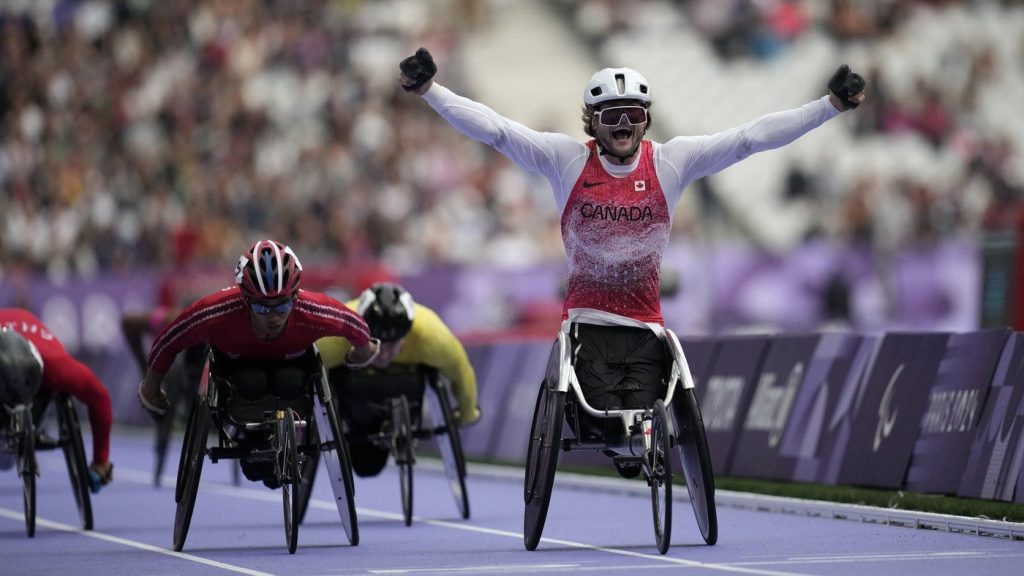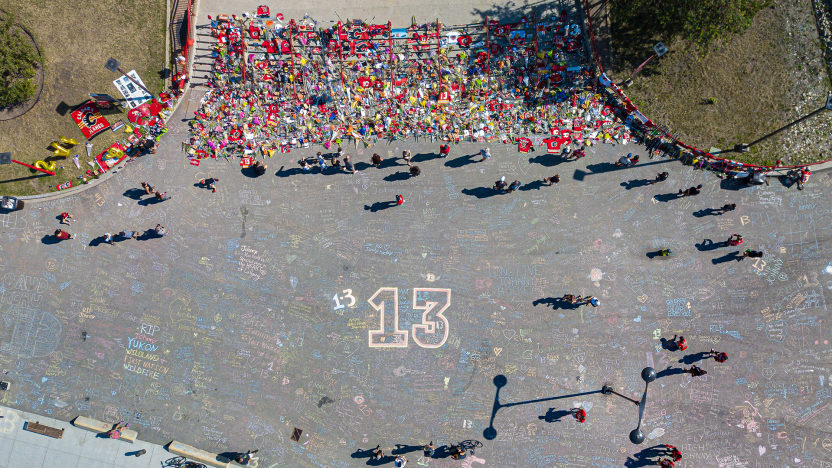Canadian wheelchair racer Austin Smeenk wins Paralympic gold medal

Posted Sep 7, 2024 6:12 am.
Last Updated Sep 7, 2024 7:28 am.
Austin Smeenk rang the bell with gusto.
The Canadian wheelchair racer won the men’s T51 800 metres Saturday at the Paralympic Games in Paris.
Track and field victors at both the Olympic and Paralympic Games rang a bell engraved with “Paris 2024” at Stade de France.
The bell will be installed in a tower at Notre Dame Cathedral when the iconic edifice is restored from a 2019 fire.
Smeenk coveted the rite after watching other Canadian athletes grab the rope for a satisfying clang.
“Fantastic,” the 27-year-old from Oakville, Ont., declared.
“I’ve been looking forward to doing that since Ethan Katzberg and Camryn Rogers did it about a month ago.”
Katzberg and Rogers won hammer throw gold at the Olympic Games.
Smeenk produced Canada’s fifth Paralympic gold and eighth medal in track and field.
Victoria’s Cody Fournie won a pair of sprint gold medals in T51 wheelchair racing and Brent Lakatos of Dorval., was a victor in the T53 800.
Greg Stewart of Kamloops, B.C., defended his title in men’s F37 shot put.
Long jumper Noah Vucsics and defending 1,500-metre champion Nate Reich were still to compete in Saturday evening’s track and field finale.
Smeenk set world records in both the 400 and 800 metres earlier this year, and followed up with the first Paralympic gold of his career.
He’s a double medallist in Paris with a bronze in the 100 metres. The 400 wasn’t on the program.
The Canadian built a solid lead early in the 800 and began to pull away on the home stretch.
Smeenk threw his arms in the air before the finish line and beat the surging Chaiwat Rattana of Thailand by two-tenths of a second.
“Don’t do that, other people and other athletes,” Smeenk said. “I’m sure the coaches will appreciate me saying that. I was ultra-confident that I had everybody beat, so that’s where that came from.
“Pride comes before the fall and that could have been a real risky move. Don’t take risks that are unnecessary, especially at the Paralympic Games. Luckily I was on the winning side of that gamble.”
His fiancée Celine Trapnell was among over a dozen family members and friends at the stadium to cheer on Smeenk in his third Paralympic Games.
Smeenk was born with spastic paraplegia, which is a hereditary disease causing progressive stiffness and contraction in the lower limbs.
His power and efficiency gave him a slower arm turnover than many of his competitors in the final.
“I’ve actually been in a racing chair for 20 years. It’s been an evolution of technique and, if you’re going to be something, you might as well be efficient,” he stated.
“Learning to get top speed without doing top frequency has been an absolute development that’s been crucial to success in the longer distance races.”
The electromechanical engineering technology student at Fanshawe College in London, Ont., put those studies on hold to relocate to Victoria in 2022 and train at Athletics Canada’s West Hub with other Olympians and Paralympians.
Smeenk put his studies to work, however, as part of a team that designed his racing chair.
“Learning to think scientifically has been crucial in refining my racing chair to the level that it’s the lightest racing chair of all my competitors as well as one of the best racing chairs, I believe, at the Paralympics this year,” he said.
“Smarter every day with the things that I’ve learned and applied that to the world of wheelchair racing as best I can.”
As for how much difference the chair made in winning gold, Smeenk said: “Is it the hockey stick or is the athlete? Is it the golf club or the person swinging it?’
“It all comes together and to put any specific fraction or percentage on that is near impossible,” he continued. “It’s the culmination of doing the work physically as well as getting the racing chair to the best it can be.
“The sum of those two have led to the confidence I’ve had today to go and race to the best level I can.”








